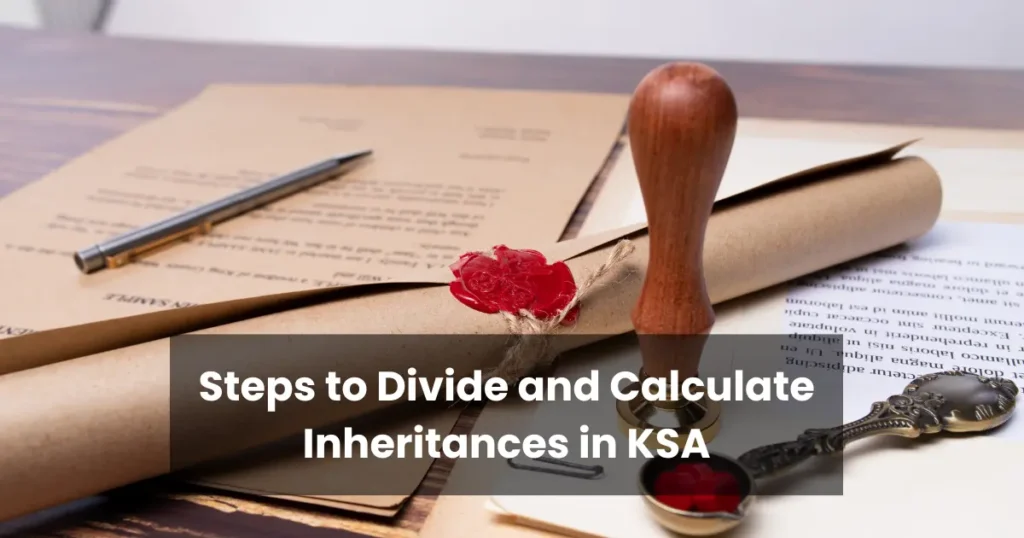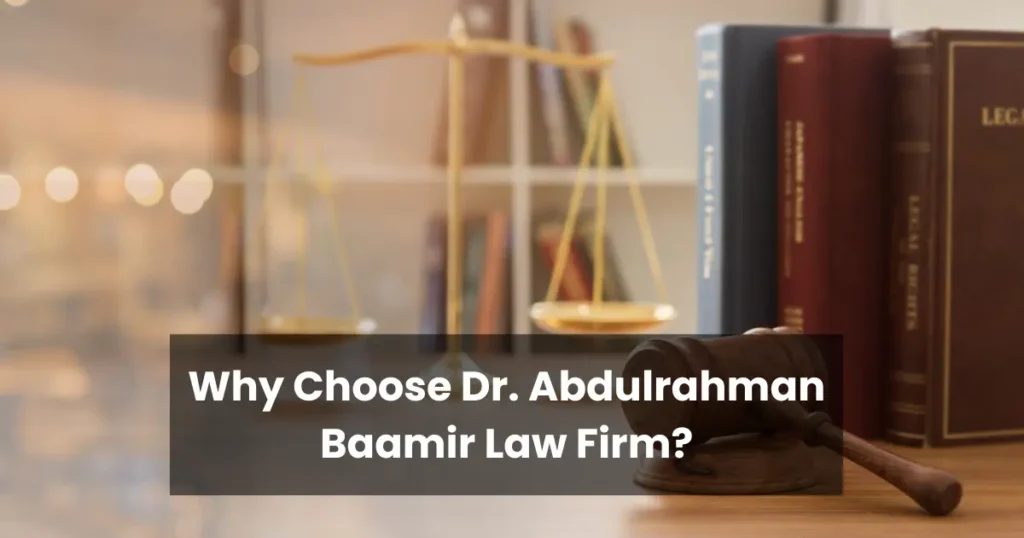Ultimate Process of Dividing and Calculating Inheritances in Saudi Arabia | Inheritance Laws in KSA (2025)
Inheritance is a fundamental aspect of life that ensures the proper distribution of assets among family members after the death of a loved one. In the Kingdom of Saudi Arabia (KSA), the process of dividing and calculating inheritances is governed by Islamic law, also known as Sharia. Rooted in the Quran and Hadith, these laws provide a structured and fair method to allocate an estate among rightful heirs.
Understanding inheritance laws in KSA is crucial not only for families managing their loved one’s legacy but also for avoiding potential disputes among heirs. The laws can be intricate, requiring a thorough comprehension of Quranic principles, the identification of legal heirs, and precise calculations of their shares.
This article delves into the key aspects of dividing and calculating inheritances in KSA, outlining the legal framework, necessary steps, and common challenges encountered during the process. Whether you are an individual planning to distribute an estate or an heir seeking guidance, this comprehensive guide will serve as a valuable resource.
At Dr. Abdulrahman Baamir Law Firm, we specialize in navigating the complexities of inheritance cases in KSA. Our expertise ensures a seamless process that adheres to the principles of Sharia while safeguarding the rights of all heirs.
Legal Framework Governing Inheritances in KSA
Inheritance in the Kingdom of Saudi Arabia is deeply rooted in Islamic law, which dictates the division of an estate among heirs based on principles outlined in the Quran and Sunnah. This legal framework aims to ensure justice, equity, and transparency in the distribution process while preserving family harmony.

Key Principles of Islamic Inheritance
- Mandatory Distribution According to Sharia
Islamic inheritance law stipulates fixed shares for specific heirs, including parents, spouses, children, and, in some cases, siblings and grandparents. These shares are clearly defined in the Quran, leaving little room for deviation. - Rights of Male and Female Heirs
While male heirs typically receive a larger share than their female counterparts, this disparity reflects their financial responsibilities under Islamic law, such as supporting the family and dependents. - Excluded and Conditional Heirs
Some relatives may be excluded from inheritance depending on the presence of closer kin. Additionally, shares may vary based on specific circumstances, such as the presence of children or a surviving spouse.
Role of Sharia Courts in Estate Distribution
In KSA, Sharia courts are the primary authority for resolving inheritance matters. Their responsibilities include:
- Verifying the Heirs: The court identifies all eligible heirs based on Islamic principles and official documentation, such as death certificates and family records.
- Calculating Shares: The court applies Quranic rules to determine each heir’s share. Professional assistance, such as legal consultants or scholars, may be sought for complex cases.
- Overseeing Disputes: Any disagreements among heirs are addressed and resolved by the Sharia court to ensure compliance with Islamic guidelines.
Documentation and Compliance
For the inheritance process to proceed smoothly, it is essential to provide accurate documentation, including property records, debt obligations, and evidence of financial transactions. Non-compliance with Sharia regulations or attempts to bypass legal procedures can lead to significant penalties and prolonged disputes.
At Dr. Abdulrahman Baamir Law Firm, we are committed to simplifying the inheritance process for our clients. Our experienced team works closely with Sharia courts to ensure that the distribution aligns with Islamic principles while protecting the rights of all parties involved.
Steps to Divide and Calculate Inheritances in KSA
The process of dividing and calculating inheritances in the Kingdom of Saudi Arabia requires adherence to Sharia principles, detailed documentation, and precise execution. Below is a step-by-step guide to help individuals navigate this process:

Step 1: Identifying the Legal Heirs
- Determine the Family Structure:
Begin by identifying all relatives who may qualify as heirs. This includes immediate family members (spouse, children, and parents) and, in some cases, extended family such as siblings or grandparents. - Verify Eligibility:
The eligibility of heirs depends on the presence of closer relatives. For example, a son may exclude siblings from inheritance, while a surviving spouse is always entitled to a share. - Gather Documentation:
Essential documents include:
- Death certificate of the deceased.
- Family records (birth certificates, marriage certificates).
- National IDs of all heirs.
Step 2: Calculating Shares According to Quranic Guidelines
- Understand the Quranic Fractions:
Sharia law defines fixed shares for specific heirs. For instance:
- A spouse may receive one-fourth or one-eighth of the estate, depending on whether children exist.
- Sons typically inherit double the share of daughters.
Identify Remaining Portions (Asaba):
After fixed shares are allocated, the remaining estate (if any) is distributed among heirs who qualify as residuary (Asaba), such as sons and brothers.
Address Special Circumstances:
Complex situations, such as the presence of debts, endowments (Waqf), or gifts, may require expert analysis to adjust calculations accordingly.
Step 3: Accounting for Debts and Obligations
- Settle the Deceased’s Debts:
Before dividing the estate, debts owed by the deceased must be paid off. This includes loans, unpaid Zakat, and pending financial obligations. - Fulfill Bequests (Wasiyyah):
If the deceased left a will (Wasiyyah), up to one-third of the estate can be allocated as per their wishes, provided it does not infringe on the rights of legal heirs.
Step 4: Distributing the Estate
- Prepare the Estate Inventory:
Compile a comprehensive list of all assets, including real estate, cash, investments, and personal belongings. - Divide the Estate:
Use the court-verified shares to distribute the estate among heirs. In cases of disagreements, the Sharia court mediates to ensure fairness and compliance with Islamic law.
Step 5: Resolving Disputes Among Heirs
Inheritance disputes are not uncommon and can arise due to misunderstandings, unclear documentation, or perceived unfairness. To prevent or address such issues:
- Engage a Legal Expert:
Seek professional guidance from a qualified attorney experienced in Sharia inheritance law. - Mediation Services:
Utilize mediation to resolve disputes amicably before escalating the matter to court.
At Dr. Abdulrahman Baamir Law Firm, we specialize in guiding families through each step of the inheritance process in KSA. Our dedicated team ensures that all legal and Sharia requirements are met, providing peace of mind and safeguarding the rights of heirs.
Common Challenges in Dividing Inheritances in KSA
The process of dividing and calculating inheritances in Saudi Arabia, while structured, can present various challenges. These obstacles often stem from misunderstandings of Sharia principles, incomplete documentation, or disagreements among heirs. Below are some of the most common challenges:

1. Disputes Among Heirs
- Conflicts Over Shares:
Disagreements can arise when heirs perceive the division of shares as unfair, especially in cases involving step-siblings or extended family members. - Lack of Consensus:
Some heirs may contest the eligibility of others or the inclusion/exclusion of specific assets, prolonging the process.
2. Incomplete or Inaccurate Documentation
- Missing Records:
Essential documents, such as property deeds, debt statements, or family registries, may be unavailable or incomplete, delaying the inheritance process. - Unregistered Assets:
Assets not formally registered under the deceased’s name, such as informal property agreements, can complicate estate division.
3. Debt and Financial Obligations
- Overwhelming Debts:
If the deceased has significant debts, settling them before distributing the estate can deplete the assets, leaving little or nothing for heirs. - Disputes Over Prior Loans or Advances:
Disagreements can occur if one heir claims repayment of a loan given to the deceased, reducing the estate available for distribution.
4. Complex Family Dynamics
- Multiple Marriages:
In families where the deceased had multiple spouses or children from different marriages, determining shares can be more complicated. - Disinheritance Issues:
Situations where an heir is believed to have been disinherited, whether formally or informally, can lead to prolonged disputes.
5. Lack of Understanding of Sharia Principles
- Misinterpretation of Quranic Rules:
Heirs unfamiliar with Islamic inheritance laws may have unrealistic expectations about their shares or fail to understand the fixed nature of certain portions. - Overlooking Residual Shares (Asaba):
Errors in calculating and distributing residual shares can result in unjust outcomes.
6. Valuation of Assets
- Disputed Asset Values:
Determining the market value of real estate, businesses, or other properties can lead to disagreements among heirs. - Liquidation Challenges:
Some heirs may prefer to sell assets to divide the proceeds, while others might want to retain ownership, causing friction.
7. Delays in Court Proceedings
- Administrative Delays:
Overburdened Sharia courts or incomplete submissions can extend the timeline for obtaining inheritance rulings. - Complex Cases:
Inheritance disputes involving international assets or heirs living abroad often require additional legal and logistical efforts.
Overcoming These Challenges
Navigating these challenges requires professional legal expertise and a clear understanding of the inheritance process. At Dr. Abdulrahman Baamir Law Firm, we help families resolve disputes, ensure accurate documentation, and facilitate seamless distribution of estates. Our experienced team works diligently to uphold Sharia principles while protecting the interests of all parties involved.
Role of Legal Experts in Inheritance Cases
Dividing and calculating inheritances in Saudi Arabia requires a thorough understanding of Islamic inheritance laws and legal procedures. Engaging legal experts can significantly streamline the process, minimize disputes, and ensure compliance with Sharia principles. Below are the key roles played by legal professionals in inheritance cases:

1. Expert Guidance on Sharia Law
Legal experts well-versed in Islamic law help families interpret Quranic inheritance principles accurately. They ensure:
- Correct Identification of Heirs:
Confirming eligibility and determining the rightful heirs according to Sharia guidelines. - Precise Calculation of Shares:
Applying Quranic fractions to calculate the exact shares of each heir, especially in complex family structures.
2. Documentation and Compliance
Legal professionals assist in gathering and verifying essential documents, such as:
- Death certificates and family records.
- Property deeds, bank statements, and investment records.
- Loan agreements and other financial obligations.
They also ensure all submissions to the Sharia courts comply with local regulations, preventing delays or rejections.
3. Resolving Disputes Among Heirs
Inheritance disputes can strain family relationships and delay the division process. Legal experts act as neutral mediators, helping to:
- Clarify Misunderstandings:
Addressing misinterpretations of Islamic laws or disputes over asset valuations. - Facilitate Fair Agreements:
Negotiating settlements to resolve conflicts without escalating the matter to court.
4. Representation in Sharia Courts
Legal experts provide invaluable representation during inheritance proceedings by:
- Filing Applications:
Preparing and submitting inheritance claims to the appropriate Sharia court. - Advocating for Heirs:
Presenting evidence and arguments to protect their clients’ rights and ensure equitable distribution.
5. Managing Complex Estates
Inheritance cases involving diverse assets or international elements require specialized expertise. Legal professionals handle:
- Asset Valuation and Division:
Ensuring accurate valuation and fair division of properties, businesses, and investments. - Cross-Border Inheritance Issues:
Addressing challenges related to heirs or assets located outside KSA.
6. Debt Settlement and Compliance
A legal expert ensures that all debts and obligations of the deceased are settled before the estate is distributed, in line with Sharia requirements. They also assist in implementing any legitimate bequests (Wasiyyah) without infringing on heirs’ rights.
Why Choose Dr. Abdulrahman Baamir Law Firm?
At Dr. Abdulrahman Baamir Law Firm, we specialize in inheritance cases in Saudi Arabia, offering comprehensive legal support to families navigating this intricate process. Our experienced team ensures that every step, from identifying heirs to distributing assets, is handled with precision and care.
With our deep understanding of Sharia principles and legal procedures, we provide tailored solutions to meet the unique needs of each family. Contact us today for expert guidance and peace of mind during the inheritance process.
Conclusion
Dividing and calculating inheritances in KSA is a complex yet essential process governed by Islamic principles and legal requirements. Ensuring that the estate is distributed fairly among rightful heirs not only upholds Sharia law but also preserves familial harmony. From identifying legal heirs and settling debts to resolving disputes and managing intricate estates, each step demands precision and a deep understanding of Islamic inheritance rules. Engaging a qualified legal expert is crucial to navigating this process effectively and avoiding potential challenges.
At Dr. Abdulrahman Baamir Law Firm, we pride ourselves on providing unparalleled expertise and comprehensive support in inheritance cases. Our commitment to accuracy, fairness, and compliance with Sharia principles ensures that families can navigate these sensitive matters with confidence and ease. Whether you need assistance with calculations, documentation, or dispute resolution, our experienced legal team is here to guide you every step of the way. Trust us to safeguard your family’s legacy and secure a seamless inheritance process. Contact us today to learn how we can assist you.
